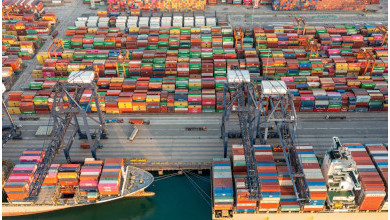Report: Global Port Congestion Getting Worse

The lifelines of global trade are becoming more expensive, with port congestion worsening and turning widespread world-wide.
That’s according to a report released Tuesday by Michael Tran and Jack Evans at RBC Capital Markets, who use alternative data and geospatial intelligence to track 22 of the world’s largest and most influential ports. It points out that one-fifth of the global container fleet is currently stuck in congestion at various ports, and less than 40 percent of ships are arriving on time. Meanwhile, freight prices are still elevated, while marine fuel prices and insurance costs are soaring.
The report outlines a multitude of forces that are likely to translate into even-higher costs for consumers, already grappling with U.S. inflation at a four-decade high.
Widespread expectations that inflation may have already peaked, as suggested by some signs in the last consumer-price index report, may be “wishful thinking,” according to Ben Emons, managing director of global macro strategy at Medley Global Advisors, who has been tracking the flow of goods.
If anything, forces outside of the Federal Reserve’s control are growing, just as policy makers are getting ready to deliver their first 50 basis point rate hike in almost 22 years on Wednesday. And “there’s no way rate hikes will bring container ships back from Shanghai any quicker to L.A.,” Emons said by phone.
Click here to read the full report from Vivien Lou Chen in MarketWatch.



